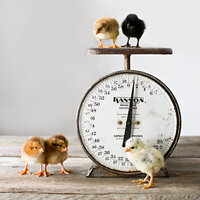ZZZ
Chirping
- Apr 1, 2020
- 43
- 192
- 74
I am wanting to try my hand at breeding on the smallest of scales, and could use some advice on setting up the pen/s and managing the breeding...
I've recently completed my first two mini hatches, using eggs from a local breeder. (Picture of a few of them attached, just for fun.) Taken together with our existing flock, I'm expecting to end up with about a dozen hens and two roosters (a Black Copper Marans, and a Cream Legbar). I know from reading here on BYC that I am pushing it with my hen to rooster ratio, and I may very well downsize to just one rooster soon enough. But I'd really like to be able to breed both roosters first (and thereby increase the number of hens and better the ratio, without having to purchase more fertilized eggs).
Currently, we have a pen that would be big enough to house them all together, but of course we'll need a different set-up if we're breeding with two roosters. One thing (of many! ha!) I don't understand is how the pecking order is affected/managed as different groupings of chickens are moved in and out of breeding pens. Help!?
Any and all thoughts would be super appreciated! I've got lots of time to plan this out and build accordingly, as the babies won't be mature until late summer/fall. (I also haven't decided whether I'd hatch eggs in the fall/winter, with all the extra accommodations that would be needed to nurture babies through our long, cold, Southern Idaho winter -- or wait until spring.)
Thanks in advance for any input!
** As a side note, I may have an extra rooster in each of the following breeds if anyone nearby is interested: Black Copper Marans, Welsummer, and Blue Laced Red Wyandotte. They're currently age 2-6 weeks. I want to hold onto them all a while longer until I'm sure of what we've got, but would be happy to share any deemed "extra" at no cost. **
I've recently completed my first two mini hatches, using eggs from a local breeder. (Picture of a few of them attached, just for fun.) Taken together with our existing flock, I'm expecting to end up with about a dozen hens and two roosters (a Black Copper Marans, and a Cream Legbar). I know from reading here on BYC that I am pushing it with my hen to rooster ratio, and I may very well downsize to just one rooster soon enough. But I'd really like to be able to breed both roosters first (and thereby increase the number of hens and better the ratio, without having to purchase more fertilized eggs).
Currently, we have a pen that would be big enough to house them all together, but of course we'll need a different set-up if we're breeding with two roosters. One thing (of many! ha!) I don't understand is how the pecking order is affected/managed as different groupings of chickens are moved in and out of breeding pens. Help!?
Any and all thoughts would be super appreciated! I've got lots of time to plan this out and build accordingly, as the babies won't be mature until late summer/fall. (I also haven't decided whether I'd hatch eggs in the fall/winter, with all the extra accommodations that would be needed to nurture babies through our long, cold, Southern Idaho winter -- or wait until spring.)
Thanks in advance for any input!
** As a side note, I may have an extra rooster in each of the following breeds if anyone nearby is interested: Black Copper Marans, Welsummer, and Blue Laced Red Wyandotte. They're currently age 2-6 weeks. I want to hold onto them all a while longer until I'm sure of what we've got, but would be happy to share any deemed "extra" at no cost. **





